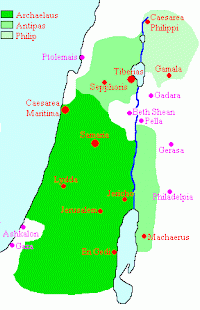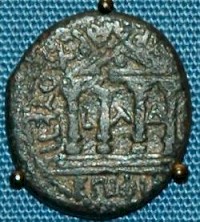Philip
Philip: Jewish leader, ruled between 4 BCE and 34 CE in the southwest of what is now Syria.

Philip was the son of the Jewish king Herod the Great and his wife Cleopatra of Jerusalem. He was married to his relative Salome. (In the Gospel of Mark 6.17, Philip is mentioned as the first husband of Herodias. This is a mistake; Herodias was never married to Philip.)
Together with his half-brothers Herod Archelaus and Herod Antipas, he was educated at Rome, a kind of honorable detention to guarantee his father's loyalty. When Herod the Great died in 4 BCE, Philip became tetrarch of the outlying parts in the northeast of his father's kingdom: Gaulanitis (the Golan heights), Batanaea (or Basan, the southern part of modern Syria), Trachonitis and Auranitis (Hauran).
Among his subjects, the Jews were a minority; most people were of Syrian or Arab descent. The latter had a nomadic way of life, although Herod had established some towns (such as Adraa, modern Dar`a). Philip was to continue this policy in the western half of his realm, strengthening the villages Paneas - at the sources of the Jordan - and Bethsaida, calling them Caesarea and Julias in honor of the emperor and his daughter Julia.
To his nomadic subjects, Philip behaved himself as a sheik. He was constantly traveling through their country with only a small entourage. When someone invoked his help, he immediately ordered his throne to be set down, heard the complaints and gave his opinion. His subjects in the cities considered this behavior rather remarkable, but the Arabs must have thought of their king as "one of us".

He had Greek and Roman subjects too, usually living in the cities. They must have appreciated his coinage. The example to the left shows the Roman emperor Tiberius wearing his laurel wreath; on the reverse one could discern an unidentified Greek temple with the name of the tetrarch around. (Incidentally, this coin proves that Philip had not many Jewish subjects, because the representation of a pagan temple and the divine emperor were considered blasphemous by any pious Jew.)
He died at Julias in 34 CE, having ruled his dominions for thirty-seven years. According to the Jewish historian Flavius Josephus, he had been a person of moderation and quietness in the conduct of his life and government.note Since he left no sons, the emperor Tiberius ordered his realms to be added to the province of Syria. When Tiberius died in 37, his successor Caligula almost immediately restored the principality; as its king, he appointed Philip's nephew Herod Agrippa.
Literature
The most important ancient source for the rule of king Philip was written by Flavius Josephus: his Jewish Antiquities.
Modern literature: Nikos Kokkinos, The Herodian Dynasty: Origins, Role in Society and Eclipse (1998 Sheffield)